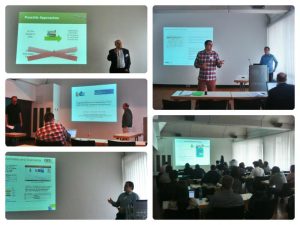News Story
KMi delivers the 2nd International Workshop on Cloud Education Environments
Friday 10 May 2013
The 2nd annual International Workshop on Cloud Education Environments (WCLOUD 2013) took place on May 7 in Aachen, Germany. The event was organised and delivered by Alexander Mikroyannidis (KMi), Hans-Christian Schmitz (Institut für Deutsche Sprache, Germany) and Rocael Hernandez (Galileo University, Guatemala). This year, WCLOUD was a shared event between the 5th International Conference on Computer Supported Education (CSEDU) and the 3rd International Conference on Cloud Computing and Services Science (CLOSER).
The event was well attended and a lively discussion would follow each paper presentation. The presented papers covered a wide range of topics related to Cloud Education Environments, with a focus on applications in real-life educational contexts and evaluations by learners and educators.
Alexander Mikroyannidis presented the results of the ROLE project in terms of the lessons learned from the project’s test-beds. He provided an overview of the approaches followed in each test-bed for supporting self-regulated learning, as well as the impact of these approaches in the learning context of each test-bed.
The new project weSPOT was also presented by Alexander at CSEDU. weSPOT is a 3-year FP7 project, which started last October and aims at propagating scientific inquiry as the approach for science learning and teaching in combination with today’s curricula and teaching practices.
The WCLOUD papers will be published in the CSEDU proceedings under an ISBN reference, both on paper and on CD-ROM. They will also be available at the SCITEPRESS Digital Library and indexed by Thomson Reuters Conference Proceedings Citation Index (ISI), INSPEC, DBLP and EI (Elsevier Index).
Related Links:
Latest News
KMi’s report from SEMANTiCS 2025
KMi wins OU recognition of Excellence in Teaching Award
KMi experts present insights on Technology-Facilitated Gender-Based Violence to UN committee
KMi with a impactful presence at Open Repositories 2025
Alexander Mikroyannidis appointed International Expert in Distance Learning by A3ES

